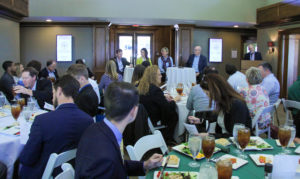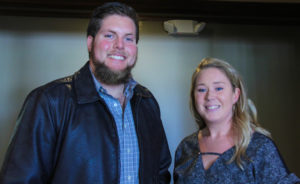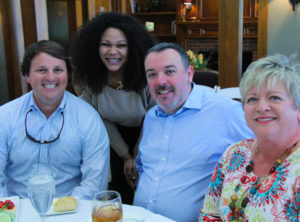By Sheri Webber
Branding and differentiating in the consumer goods industry was the topic of a March 23 panel discussion sponsored by the Jacksonville University (JU) Davis College of Business (DCOB) Consumer Goods and Services Marketing Program. This industry-centric degree path takes a ‘job ready’ approach and includes customized and applied learning, seminars, and a leadership speaker series.
Among experts and leaders invited to attend the packed-house luncheon at JU’s River House last Friday were panelists Katie Barnes of Georgia Pacific, Mike Diaz of the St. Augustine Distillery Company, Michelle DuFresne of KeHE Distributors, and Jerry Edwards of Applegate. Moderated by DCOB Executive in Residence Jack Parker, panelists delved into the topic of leveraging social cause marketing to enhance both brand and growth.
The round-table experience, attended by students, faculty, and key business leaders, was prefaced by recent DCOB survey findings centered around marketing for ‘Generation Z,’ identifying this group of consumers, born between 1995 and 2005, as responsible for $29 to $143 billion in direct spending and making up roughly 25 percent of the U.S. population. The most significant survey result, and the motivation behind the student-organized forum, showed that 80 percent of Generation Z consumers purchase brands that support a cause that matters to them.
“Social cause marketing, first and foremost, has to be real.”
“Social cause marketing, first and foremost, has to be real,” said Mike Diaz, Co-Founder and Chief Financial Officer of the St. Augustine Distillery Company. Holding degrees from the University of Florida, Diaz’ career experience includes well-known names like KPMG, Acosta, Black Diamond, and FabTech. From a C-level perspective, Diaz said, “It comes down to what matters to the members of our community and what will leave our community better than yesterday.”
 Michelle DuFresne, Vice President of Sales for KeHE, has been in the natural and specialty foods industry for nearly 25 years and offered her unique perspective from the manufacturing side of the industry, as well as a sales leader who encounters multiple brands on a daily basis. “What we talk about with manufacturers and ask them is, ‘How are you going to tell your story?’ If you can’t tell your story on the shelf,” Michelle said, and all panelists agreed, then you have a problem.
Michelle DuFresne, Vice President of Sales for KeHE, has been in the natural and specialty foods industry for nearly 25 years and offered her unique perspective from the manufacturing side of the industry, as well as a sales leader who encounters multiple brands on a daily basis. “What we talk about with manufacturers and ask them is, ‘How are you going to tell your story?’ If you can’t tell your story on the shelf,” Michelle said, and all panelists agreed, then you have a problem.
According to survey results interjected by Parker, along with advice shared by the panel, authenticity is critical when it comes to social cause marketing. In fact, the March 2018 survey revealed that 34 percent of Generation Z will “run away” from brands they perceive as inauthentic. “We use that word authentic a lot,” DuFresne said. “But people know, and they can read you.” Her company is a proponent of what she called “people-centric” causes that emerge organically from the grassroots efforts of employees and other business partners.
The Applegate approach is vastly different, according to Jerry Edwards, who explained the brand as its own social cause which advocates for “changing the meat we eat.” The mission-based work culture of Applegate was a huge draw to Edwards who had previous experience with Quaker Oats and ConAgra Foods. Audience members chuckled when Edwards said, “Cap’n Crunch did not stand for cause marketing.” Social causes mattered to him, from the viewpoint of someone in sales, enough to seek out Applegate. According to Parker, social causes also matter enough that 69 percent of Generation Z consumers donate their time to social causes and charities.

Madison Black, a Marketing and Management double major at JU, is minoring in Consumer Goods and Services Marketing. She is half of the student duo who organized the afternoon event. “This class is unlike any that I have taken while at JU.” She says the event planning, for her, was a bit of trial and error, and she found the responsibility of great value as she discovered the many behind-the-scenes moments that go into a successful talk-back forum like this. At her side was Ian Hall, a junior majoring in Economics and no stranger to leadership. Hall stands among DCOB’s Top 40, Green Key Honor Society, Omicron Delta Kappa, the JU Honors program, and is the football representative for the University’s Student-Athlete Advisory Committee.
“We collaborated and worked with Professor Parker from start to finish. Overall, this was a team effort.”
From collaborating with JU and Aramark officials on the logistics of the event to managing the ticketing and registration, Hall and Black were boots on the ground. Perhaps the largest aspect of planning and researching for the event was conducting the survey on campus. Together, Black and Hall not only designed survey questions and interacted face-to-face with respondents, but they also processed all data collected. “The results were a shock to me initially,” Hall said. “The biggest takeaway is that social cause marketing truly matters and has a significant impact on consumer purchasing decisions.”
Several of the panelists traveled far and wide to attend, one hailing from New Jersey and another from Atlanta. Katie Barnes, Customer Planning Manager for the Brawny ® Paper Towel brand, described a specific social cause campaign Georgia Pacific launched about this time last year in recognition of Women’s History Month. Barnes said, “It was important to us to show real women in their real lives.” The campaign, #StrengthHasNoGender, featured diverse women or groups of women wearing the hallmark red flannel belonging to the iconic Brawny Man. A multifaceted campaign and large investment for the company, it experienced some push-back from loyal brand customers who expressed their dismay with the marketing strategy, Barnes said. Other panelists shared similar experiences with “pitfalls” they ran across over their careers and then more deeply explored instances of social cause marketing gone wrong.
“The biggest takeaway is that social cause marketing truly matters and has a significant impact on consumer purchasing decisions.”
Other points of interest covered by guest speakers and brand experts included single-cause companies, ROI, start-ups and social cause marketing, top-down approaches, and internal leveraging of social causes and brand loyalty.
Parker asked the panel to list businesses present in the Jacksonville area and northeast Florida region that they most admired. Patagonia ® Clothing, Clif Bar & Company, Growers Alliance, Trader Joe’s, and Whole Foods made the cut.
 In addition to a Q&A session at the conclusion of the event, panelists also offered practical wisdom to students seriously pursuing careers in business, sales and marketing. “The most significant thing I can say is make sure you believe in where you work.” That was the advice Barnes gave. “When I was a student I was just looking for the best paying job and didn’t really think about much else.” Now, it is a deciding factor in her choice of companies, as an employee and a consumer.
In addition to a Q&A session at the conclusion of the event, panelists also offered practical wisdom to students seriously pursuing careers in business, sales and marketing. “The most significant thing I can say is make sure you believe in where you work.” That was the advice Barnes gave. “When I was a student I was just looking for the best paying job and didn’t really think about much else.” Now, it is a deciding factor in her choice of companies, as an employee and a consumer.
“I wouldn’t be an effective resource for a company if I wasn’t all-in.”
DuFresne agreed and said, “That would be challenging for me not to believe in something I was doing for forty-plus hours a week. I wouldn’t be an effective resource for a company if I wasn’t all-in.” Edwards concurred and told of a recent interview he conducted with a potential new hire. The candidate said to him, “It would be nice to work for a company where I can actually eat the products we sell.” He encouraged students to find what they are passionate about and talk only to those companies.
An emphasis on authenticity, honesty, excellence, and loving what you do is nothing new or unusual at Jacksonville University, where President Tim Cost, a veteran of some of the biggest brand names in corporate America over his 30-plus years in business, challenges and encourages students. “The goal here is not just to award a degree. The goal is to spark a lifelong passion,” he says. “You can be anything you want to be and you can build that right here, at this university.”
 Wave Magazine Online Jacksonville University News Hub
Wave Magazine Online Jacksonville University News Hub
